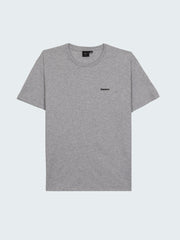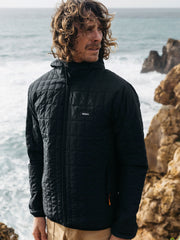Song of My People | Colin Macleod
01.26.21
4 min read
Tell us a little bit about your life as a crofter – what is crofting, how does it play out in your day-to-day and what’s the history behind this unique way of life?
Yeah, so crofting is basically a form of subsistence farming which was set up to enable people on the West Coast of Scotland to grow some food and supplement their income. A croft is also a piece of land, but crofting itself has always been a little more varied. It could include cutting peat for fuel, a little bit of fishing, maybe a bit of weaving. It was this kind of rag-tag thing where you would do a bit of everything and make maximum use of the area surrounding you. It’s basically a really old fashioned self-sufficient lifestyle.
My dad’s a crofter, my grandad was a crofter, my great grandad was a crofter… so yeah, in the village I’m from the tradition goes back a long way. Each village has a crofting council, because as part of your croft you also become a shareholder in a much bigger area which is called the ‘common grazing’. So here, our croft itself is about eight or nine acres, but the common grazing area is about 800 acres. Because the grazing and the quality of the soil is so poor, everybody shares the good stuff and that’s how we make it work.
So is it mainly just sheep, or do you have any other animals?
My dad’s got chickens… that’s a bit of a contentious point though because my cat killed them all! I’ve got the biggest cat in Scotland I think. It’s about three foot long and it killed all his chickens. So yeah, we don’t have any because of that. We kept pigs for a while and we grow veggies, but the growing season is really limited. You are very limited in what you can do, and that’s why people always try to diversify into other things.
And is that primarily farming the sheep for their meat or wool? How does that work into the lifestyle?
The animal farming in crofting traditionally was for your food. On top of that, you would maybe have enough land to grow some potatoes to do you for a winter, and turnips and things like that. That’s the traditional thing, all with the idea that you would be supporting your family.
Wool has never really been a lucrative market for crofters but there are some people looking into it. I had a guy come visit me a few years ago and he kind of planted a seed. He said, “Oh, are those black faced sheep? There’s a company in Germany that uses black faced sheep wool to make really expensive sleeping bags.”
So that’s something I’m interested in – trying to find something in the modern market that suits our traditional way of doing things and making a little bit more from what we have here. At the moment, it’s just an idea. Most people on the island are signed up to the Wool Board and that’s a great organisation because people have a guaranteed price for their wool, but it’s gone so low in the last few years that in a lot of cases people have been paying to get rid of their wool. In fact, it’s gone so low in the last few years that some people have been keeping their wool to throw on the compost heap because it’s got more value there than selling it!
Your life as a musician and a crofter seems like a crazy juxtaposition. How do you manage these two very different parts of your life and do them simultaneously?
Yeah, it’s pretty funny! When I started working with my manager, quite a few years ago now, she was like, “is there anything I need to put in the calendar? Anything important where you really can’t go on tour?” And I was like, “yeah, April.” So she goes, “what, all of April?!” And I’m like, “yeah… that’s Lambing time!”
And she really couldn’t believe it. Not until I was sending her pictures of me with a lamb covered in blood, and I’m like, “I’m not joking! I really am lambing!”
When I say it to people, I think they think I just go out and stand on the hill with my dog, take a photo for Instagram and go, ‘hey, look at me, I’m a crofter!’ But no – I’m ankle deep in sheep muck in a barn in April with lambs being born! So I said to her, “No, I’m really, really into this – I’m not just playing at it. This is actually what I do!” And now, of course, they all love it. They think it’s great. I’m really lucky I work with people who understand my lifestyle who are like, “yeah, you do that, that’s great! We’ll sort out the rest.”
From the outside, the crofting life seems tough and isolated – it’s not for everyone! Plus you have this music career running alongside it. What is it about the lifestyle that attracts you and makes you want to keep this heritage alive?
Oh man… I don’t know. When you say it back to me like that, it’s just nuts! I guess I realised that I couldn’t do one without the other. My creative output and my songs – especially the writing and the words – it all came from this life. It all came from me being the son of a crofter, living on the island, working during the week and doing gigs on a Saturday night, feeding the sheep and lambing, all that kind of stuff. When I went away and came back I realised that I had nothing to write about if I wasn’t the person I was meant to be; if I wasn’t here being a crofter. So I think that’s the root of it.
The crofting and the heritage thing, ever since I was young it’s always been super important to me. I think I was born an old man really. When I was in school as a teenager, I would go and visit the old boys in the village to talk about crofting and fishing and what it was like in the old days. It’s just always been a really ingrained part of me.
So having been involved in it for so long, do you have any funny crofting stories that you can share with us?
Oh yeah, there’s never a time when there’s not something ridiculous going on! We made a programme for the local Gallic channel up here last year or the year before. I was doing my best ‘I’m a real crofter’ – I had my orange oilskins on and I was leaning on the wall and gesturing with my hands a lot, surveying the landscape. And I never realised, but behind me a sheep jumped over the wall and ran away. The guy who was filming it was my mate, and he’s like, “are all your sheep in here Colin?” And I’m like, “yeah, yeah they’re all in here.” So he points and goes, “what about that one, out there?” And I was like, “oh… yeah… I better go get that one.”
And then of course, because it was a mate, he also filmed me running around chasing after it for about half an hour…
The lifestyle you lead must mean you’re pretty comfortable with solitude and isolation. With the UK now in another national lockdown, do you have any tips that you could share for dealing with that?
To be honest, I think I’m the kind of person who would need techniques to deal with the opposite! When I lived in London, I was there for three years and I never really got used to it. I just find it comforting; the space, the solitude, the time to myself…
Wandering out on the moor on my own with the dogs, that’s when I feel happiest.


















































































